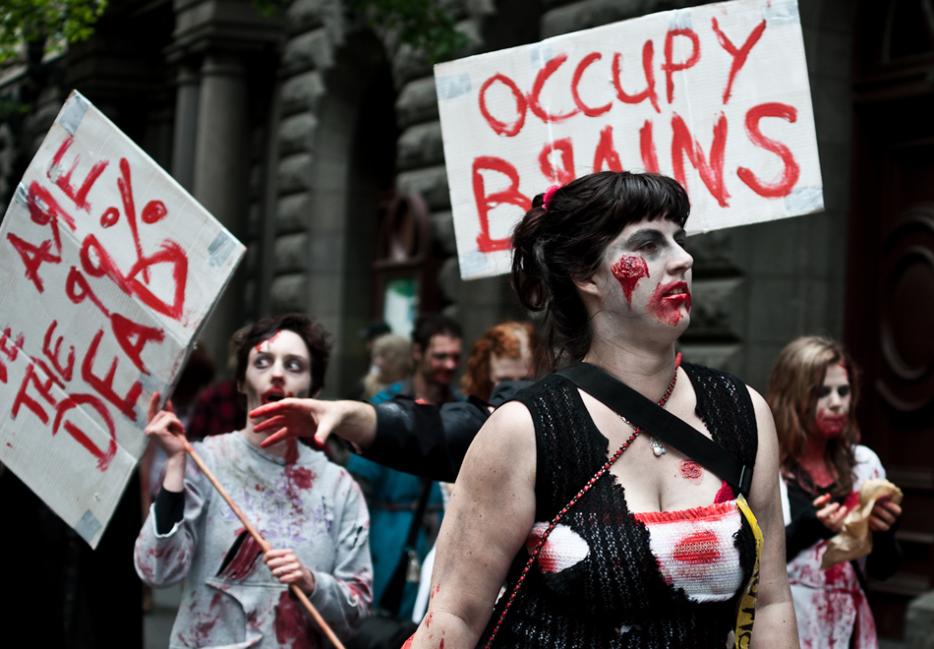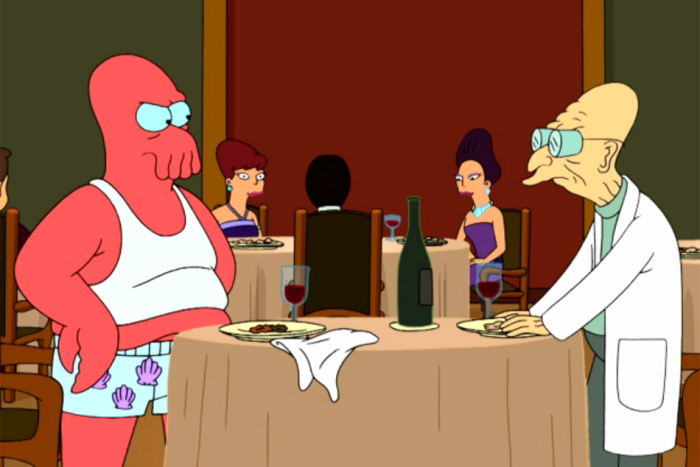In the book World War Z: An Oral History of the Zombie War, the United States belatedly responds to an epidemic that has chased the surviving government to coastal enclaves with a massive rearmament effort, invoking by design the shift the Americans made during World War II. The narrative of the book comes complete with descriptions of members of the former global elite, trying to figure out how they’ve lost everything and are now taking orders from their former cleaning staff as they learn more useful wartime tasks.
Those scenes are utterly missing from the film adaptation opened this past weekend. I like to think that the writers knew the audience would accept zombies without question, but balked at the idea that anything (including the apocalypse) could force social responsibility on the One Percent.
And why would our beneficent overlords bend the knee to anyone, when they’ve got such loyal court jesters? In the last week, blogging economists have been responding to Harvard economist Greg Mankiw’s apparently not-satirical-on-purpose “Defending the One Percent” (.pdf), in which he argues that the rapidly increasing wealth and income inequality of the last few decades is actually good for us. After all, Steve Jobs wouldn’t have invented the iPod to be a mere billionaire, and J.K. Rowling wouldn’t have written the Harry Potter books if all it had promised was getting her out of grinding poverty and into the middle class.
That Mankiw was an advisor to both George W. Bush and Mitt Romney shouldn’t shock us, though it is surprising that a Harvard Economist can get away with lazy arguments such as “I do not see my children as having significantly better opportunities than I had at their age,” when economists who study inequality closely report that, yes, the children of the bottom 50 percent really do have a harder time making it to Harvard than the children of the faculty. “Inequality lowers mobility because it shapes opportunity,” University of Ottawa economist Miles Corak writes. “It heightens the income consequences of innate differences between individuals... and it shifts the balance of power so that some groups are in a position to structure policies or otherwise support their children’s achievement independent of talent.” (Emphasis mine.)
The argument over how to share our economic pie would be a bit less urgent, and a bit less acrimonious, if there was at least evidence that the pie was growing as fast as it could be. As Paul Krugman and many, many others have been arguing since the beginning of the recession in 2008, the response from both the US government and the Federal Reserve has been woefully insufficient for an economy that, if it’s not in an outright recession anymore, is still leaving millions of people unemployed—an enduring human tragedy of enormous importance.
But even when you try to walk away from the inequality argument, it rears its head elsewhere: how can we talk sensibly about efforts to get the economy back on its feet when televised millionaires continue to rail against even the milquetoast response we’ve seen so far? When part of the US political spectrum is dominated by a party that thinks that any public works, any form of progressive taxation is the moral equivalent of Leninism?
Once upon a time, sharing a nation’s prosperity broadly wasn’t just considered a nice side effect of capitalism, it was a vital component of governing a liberal democracy. These days, it’s relegated to science fiction—and even then, kept off the big screen.






